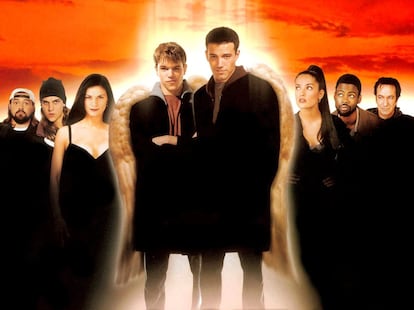‘Dogma’, the controversial religious comedy that can no longer be seen anywhere
Twenty-five years ago, independent filmmaker Kevin Smith made the leap to big-budget movies with a star-studded one. Its religious subject matter caused controversy before anyone even saw it. Today, it is not available on any streaming platform

“Though it’ll go without saying ten minutes or so into these proceedings, View Askew would like to state that this film is — from start to finish — a work of comedic fantasy, not to be taken seriously. To insist that any of what follows is incendiary or inflammatory is to miss our intention and pass undue judgment; and passing judgment is reserved for God and God alone… So please — before you think about hurting someone over this trifle of a film, remember: even God has a sense of humor. Just look at the Platypus. Thank you and enjoy the show.”
That disclaimer begins Dogma, Kevin Smith’s fourth film, a satire on religion that, as he and his production company assumed, raised hackles despite being directed by a devout Christian. It was received less enthusiastically by critics than by audiences, who made it Smith’s most-watched film. But the biggest outrage was not from film critics, but from a section of Christianity that was not enthusiastic about the film’s message. The director received death threats and groups of the faithful demonstrated at the entrances of the movie theaters where the film was being screened. Thus Dogma joined the long list of films that had angered the Church, including movies as diverse as Monty Python’s Life of Brian, Hail Mary and The Last Temptation of Christ.
Nearly 25 years after its release, it is difficult to ascertain whether its alleged level of blasphemy still applies, as it is not available on any streaming platform (although it is on YouTube). It’s not divine punishment: if Smith’s comments on the subject are anything to go by, it has more to do with “the devil.” Why did the fourth film from the hitherto innocent and sympathetic Smith repulse so many people? Let’s refresh his argument.

Dogma tells the story of Bartleby and Loki (Matt Damon and Ben Affleck), two fallen angels who seek to return to heaven even if it means the end of the world. On their way to Earth, they will cross paths with Bethany (Linda Fiorentino), a descendant of Jesus (since Joseph and Mary would have had more children), who works in an abortion clinic; Rufus (Chris Rock), the 13th apostle, who’s been erased from the Bible due to evangelists’ racism; Serendipity (Salma Hayek), a muse unable to inspire herself who ends up working at a strip club; Cardinal Glick (George Carlin, a comedian famous for his diatribes against religion), who, fed up with the “depressing” crucified Christ, tries to replace him with Christ as a colleague who winks and gives the thumbs-up; and God herself, played by singer Alanis Morissette, who only appears at the last minute because she had neglected her heavenly duties to go to New Jersey and play arcade games. Also present are two unlikely stoner prophets, regulars Jay and Silent Bob (Jason Mewes, the film’s real star, and Smith himself), and another permanent fixture of the Smith universe, Jason Lee, as the evil Azrael.
The star-studded cast was remarkable for a filmmaker who had been making movies for less than $30,000 five years earlier. Almost everyone agreed to jump on the bandwagon of Hollywood’s new wunderkind. Affleck had appeared in Mallrats and was the absolute star of Smith’s previous film, Chasing Amy, the reinvention of the romantic comedy through an indie lens. And if Affleck was there, Damon, his inseparable partner, would be too. Both were riding a wave of success following Good Will Hunting, which had enriched and positioned Miramax. Despite the fact that its owner, Harvey Weinstein, wanted them to honor their friendship with Smith and receive minimum wage, Affleck called him to tell him that either they would receive a million dollars each or they would not promote the film or work with him again.

In Down and Dirty Pictures: Miramax, Sundance, and the Rise of Independent Film, Affleck told Peter Biskind Weinstein got on a plane, showed up on set and threw a bag full of bills at their heads. The bills were Monopoly tickets, but there’s no denying the staging was grandiose. “I’m not giving you suckers a single dollar in cash,” he yelled at them before writing them a couple of million-dollar checks. “I’m sure he charged that money to some poor schmuck’s movie budget,” Affleck, who was familiar with the Miramax owner’s tactics.
Alan Rickman arrived after Smith discovered he was a big fan of Chasing Amy and made only two conditions: that his character’s wings be real (not special effects) and that they not change the script. The role of God was originally intended for actress Emma Thompson, but pregnancy kept her away from the project. As a big fan of The X-Files, Smith offered the role of Bethany to Gillian Anderson, but “heard back that she really hated it.” Thus, the part went to Linda Fiorentino.
“When I read the script I thought it was extremely clever and had very imaginative answers to all my childhood questions about angels, demons and apostles,” she stated. The relationship between the actress and the director was not smooth. On the DVD release, Smith regretted not casting Janeane Garofalo, who appears briefly in the film. “She’s the biggest pain in the ass I’ve ever worked with,” he said of Fiorentino. According to Smith, the actress, who appears in almost every scene, had complained about having to spend too much time in Pittsburgh away from civilization while everyone else went back and forth to their homes. However, her anger was largely due to the fact that her role had been reduced for the benefit of Damon and Affleck, who were more popular at the time. Nor did she take kindly to the fact that another woman’s body was used to promote the film. “She saw the poster and went nuts. They put her head on another body because she never did a photo shoot. The body had more cleavage than she has and she was pissed that nobody approved it with her, so she refused to do any more press,” Smith revealed. Today, that would be a scandal and lead to profuse apologies, but in 1999 it didn’t matter to anyone but the actress. Complaining about her breasts being replaced by larger ones got her characterized as a “problem” actress.

The truth is that Alan Rickman’s diaries also included comments about how scattered Fiorentino was during filming and how often scenes had to be repeated due to her forgetfulness, which affected him because he was wearing wings weighing almost 90 pounds that gave him a hernia. When reading these stories about the actress, it is worth remembering that the shoot was headed by Harvey Weinstein, a name that appears frequently in the stories of particularly attractive women in Hollywood who suddenly acquire a reputation for being “difficult” and mysteriously disappear from the spotlight soon thereafter. After suffering a heart attack in 2014, Smith received a message from Fiorentino and took advantage of the opportunity to apologize to her: “I was thankful to hear from her and it also gave me a chance to say I’m so sorry that I ever said that thing years ago,” explained the director.
Hate mail started pouring in during post-production. They received 300,000 pieces of hate mail, along with a couple of credible death threats. Or rather, two and a half. “I’m going to kill you. Well, maybe not,” one of them said. There was one that particularly got to Smith: " “You Jews better take the money you stole from us and start investing in flak jackets ‘cos we’re coming in there with shotguns,” it said. The “Jews” in question were the Weinstein brothers.
During the Cannes premiere, Miramax hired bodyguards. The movie’s most belligerent opposition came from the Catholic League for Religious and Civil Rights, but 30 other groups ranging from National Policemen for Life to Women for Faith and Family and the Sons of Italy expressed their discontent with the movie. If they couldn’t stop Dogma from being filmed, they would try to stop it from being released.
All of this happened before anyone had seen it. Disney feared a repeat of the scandals Miramax had experienced with Kids and Priest, the story of a homosexual priest. The point is that Dogma was the kind of film that had made Miramax what it was and why Disney had acquired it. Michael Eisner, the all-powerful owner of Disney, called Weinstein: “If anyone stops going to Disneyland because of this movie it will be too much, I don’t want you to release it.”

So, Miramax had a movie starring Damon and Affleck, the cool kids, and absolutely no one wanted to distribute it. The Weinsteins bought the film from Disney and sold it to Lionsgate, retaining the foreign distribution rights. Lionsgate had released Gods and Monsters and had American Psycho in the pipeline. It was investing big in becoming the new Miramax. “Controversy equals visibility,” the company declared.
Smith was so intrigued by the virulent reaction to his film that when he heard there was a demonstration near his home, he decided to go to it. According to the announcement, 1,500 people were expected to attend. He alerted his friend Bryan Johnson, who also appears in the film, and showed up with posters that read: “Dogma is bullshit.” When they arrived, there were barely 15 people, almost all of whom were praying the rosary. Besides Smith, there was someone else interested in that protest: Channel 12. A reporter and a cameraman arrived; they ended up interviewing Smith himself without realizing it. That night, he could be seen on television claiming that he had no intention of watching his own film.
The point is that Dogma is not irreverent. It’s a film made by a believer who takes religion seriously enough to bother to laugh at it. Despite the protests and headlines, Dogma did quite well: with a budget of $10 million, the film grossed $44 million worldwide. Today, however, it’s hard to find it, and Smith explained why.
“In order to tell the story unfortunately, I’m gonna have to say the name that nobody wants to hear anymore. But of course, Harvey Weinstein figures into the story,” he told The Wrap a couple of years ago. When the home video rights expired, the filmmaker got a call from Weinstein to talk about a possible Dogma sequel or TV series. “And I got really excited because I was like, ‘Oh my God, for the first time. The dude remembered me. Like, after a decade he remembered that I was part of the Miramax family.’ And he remembered that he had Dogma and had a cool cast and I don’t know, I felt like wow, that’s, that’s cool.” But it turned out that Weinstein was simply calling everyone he had worked with to find out who had been The New York Times’ source for the story on his abuses. A week later, the newspaper ran the story about the producer’s systematic abuse (which, of course, Smith claimed to know nothing about) on its front page, and Weinstein’s empire crumbled.
Weinstein put the rights to Dogma up for sale and Smith tried to buy them. “We felt very dirty about [it] because we didn’t want to give him money,” he said, but Weinstein “scoffed at” his offers. “He’s holding it hostage. My movie about angels is owned by the devil himself.”
Sign up for our weekly newsletter to get more English-language news coverage from EL PAÍS USA Edition
Tu suscripción se está usando en otro dispositivo
¿Quieres añadir otro usuario a tu suscripción?
Si continúas leyendo en este dispositivo, no se podrá leer en el otro.
FlechaTu suscripción se está usando en otro dispositivo y solo puedes acceder a EL PAÍS desde un dispositivo a la vez.
Si quieres compartir tu cuenta, cambia tu suscripción a la modalidad Premium, así podrás añadir otro usuario. Cada uno accederá con su propia cuenta de email, lo que os permitirá personalizar vuestra experiencia en EL PAÍS.
¿Tienes una suscripción de empresa? Accede aquí para contratar más cuentas.
En el caso de no saber quién está usando tu cuenta, te recomendamos cambiar tu contraseña aquí.
Si decides continuar compartiendo tu cuenta, este mensaje se mostrará en tu dispositivo y en el de la otra persona que está usando tu cuenta de forma indefinida, afectando a tu experiencia de lectura. Puedes consultar aquí los términos y condiciones de la suscripción digital.









































